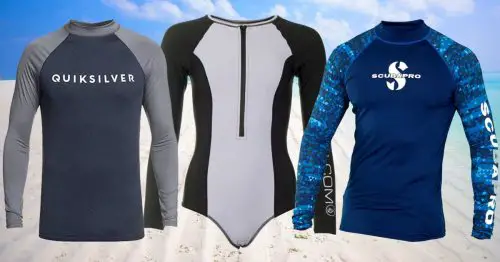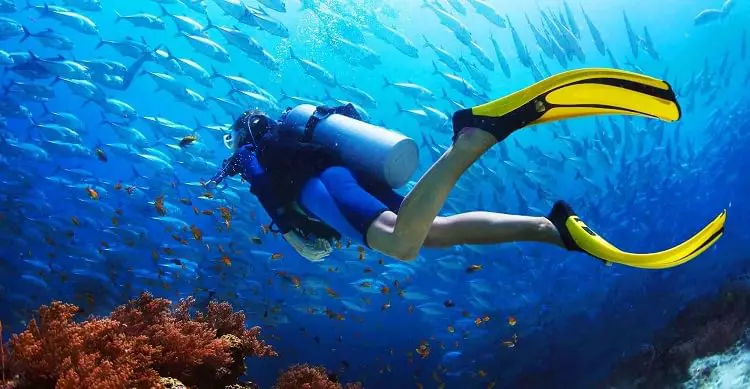If you are someone that is looking into scuba diving, then you will have had to examine a long list of the necessary equipment that you will need to invest in before you can even enter the water. All of this equipment is necessary to ensure your safety when you are underwater and allow you to get the most out of your diving experience.
Something that you may have not expected when starting your diving learning process is the number of options you really have when it comes to catering to certain aspects of the sport. For someone who has never really looked into scuba or diving in general, you may think that you are limited to simply working out the difference between a wet and dry suit and picking which one you prefer. Well, it may surprise you to know that there are other options out there on the market for you. A lot of people are actually favoring rash guards for most aquatic sports and they have been popular among surfers and ski enthusiasts for decades, but do they live up to the quality of the wetsuit, and do they keep you warm?
What are rash guards?

A rash guard is an athletic vest usually made of spandex or nylon and is very popular among surfers. A rash guard looks almost like a cropped wetsuit and is used to protect against any injury when you are doing aquatic activities. They usually have an athletic fit, which means that no excess material can be caught or torn when you are wearing them.
What do rash guards do?
Rash guards are usually worn as a means of staying safe while scuba diving or surfing. Much like a wetsuit, they are made of strong material that works as a protective barrier against any potential cuts or grazes that you may experience when in the water. The water can also be very harmful to your skin when you are in the sea, as the current can have a strong pressure which may lead to tearing of the skin and even water burns.
Rash guards usually cover the entirety of your body’s top half, which is more likely to be harmed when you are doing sports. They are also great for sun protection, as when you are spending long periods of time in the water you are more exposed to the sun’s rays. The water also has a habit of making any sunscreen that has been applied obsolete, so rash guards work in their place to ensure that you don’t get sunburn when enjoying your time in the water.
When are rash guards used?
There is no real restraint on when you can use rash guards and some people even use them when gardening. However, they are generally only used when completing aquatic activities such as surfing, snorkeling, and scuba diving. Waves in the sea can actually be extremely harsh on your skin and being in constant contact with hard water can lead to blistering and breaking of the skin. Rash guards are extremely helpful in circumstances like this, as their tough material works as a layer of protection for your skin.
Now that you know what rash guards are and how they function, it’s time to get to the question at hand, which is ‘ do rash guards keep you warm?’
Do rash guards keep you warm?
Unfortunately, rash guards were not designed with keeping you warm in mind. However, they do keep you considerably warmer than your average swimming suit, which is why a lot of people choose to wear them over their own swimsuits. When you add a new layer on top of anything, you are bound to experience more heat than before and many people have reported that they have felt more insulated heat when wearing the rash guard.
Insulated rash guard
Though original rash guards were not designed with keeping you warm as their main goal, however plenty of companies have now released insulated rash guards. These rash guards work just like the original rash guards, however, they have an additional layer of fabric that helps to insulate them and keep their wearers warm. These are the rash guards that are favored on the market, as unless you are luckily enough to be in an extremely warm country, the water that you are swimming in is bound to be cold.
Out of the water
You may be happy to learn that rash guards have your back when it comes to leaving the water. Though they do not provide a lot of warmth in the water, they are extremely helpful when you have just completed a dive. This is because the rash guard helps dry your skin faster, which means you have less water on your skin making you colder. Not only this but, but it covers more of your skin which means that you have less surface skin for the cold air to touch.
What else do rash guards protect against?

Rash guards are great for protecting your skin against water and nips and scrapes that you may experience when you are under the water, on top of this they are also great for protection against other issues you may encounter in the water.
Jellyfish
People think that it is a myth that rash guards can help protect your skin against the sting of a jellyfish, however, they actually can help. They are extremely useful against creatures such as jellyfish as jellyfish are noninvasive with their stings, which means that they only hurt you through light touch. The rash guard works as a barrier between your skin and the sting of a jellyfish and can prevent you from experiencing the usual pain that you may experience. However, this means that they won’t be able to protect you against anything that can pierce the material.
Do you need a rash guard?
Like any equipment that you may use when doing aquatic activities, rash guards are not entirely necessary. However, much like other equipment that you may choose to use, rash guards can make your experience in the water much easier and much more pleasant. They are extremely cheap to purchase and can make your day in the water much more enjoyable, by giving you an extra layer of added warmth and protection. If you regularly spend time in the water, it is likely that you have started to feel the wear and tear of spending so much time in the water and you’re looking for something to help you slightly.
